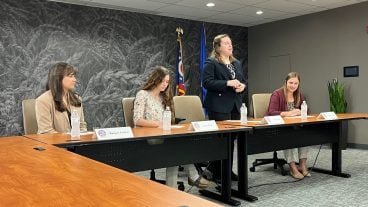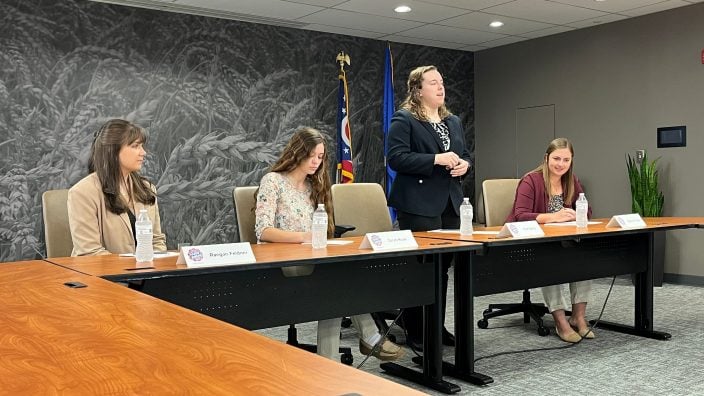Applications for Ohio Farm Bureau Health Plans now available
Members have three ways to apply: contacting a certified agent, calling 833-468-4280 or visiting ohiofarmbureauhealthplans.org.
Read MoreIt’s in their schools, their communities, and in many cases, their homes. But for many young people, the answer of what to do about Ohio’s opioid crisis isn’t clear.
“A lot of young people are concerned about the issue but aren’t sure what steps they can take to be part of the solution or to make sure they don’t become part of the problem,” said Theresa Ferrari, a 4-H youth development specialist with Ohio State University Extension. “Most teens know the issue is going on: They know if kids in their schools are doing drugs.”
Teens often wonder: “Who do I talk to about opioids? How do I bring the conversation up? How do I prevent myself and others around me from using opioids?”
Those are just some of the questions young people have regarding the opioid crisis, Ferrari said.
Enter Hope for Ohio: Teen Forum on the Opioid Crisis. It will be an opportunity to listen to teens and hear their concerns and thoughts about the opioid epidemic. The forum is Dec. 2 from 10 a.m. to 4:45 p.m. at The Ohio State University’s Nationwide and Ohio Farm Bureau 4-H Center, 2201 Fred Taylor Drive, on the Columbus campus.
The event is being held by Ohio 4-H, the youth development program of OSU Extension. Ohio Farm Bureau, with support from Nationwide, is lead sponsor of the event along with Ohio FFA and Prevention Action Alliance, a Columbus-based certified prevention agency.
The forum is designed to educate and prepare both teens and adults to take action against drug abuse in their communities, Ferrari said. It’s an important step to speak to teens about an issue that, for many, is life-threatening, she said.
“But you have to arm them with research-based knowledge so they know the facts.”
The facts are alarming.
And it’s not just adults.
A presentation from Tyler’s Light, a nonprofit that provides information and resources to help people choose a drug-free life.
A town hall-style discussion on the opioid epidemic with Jennifer Lloyd, director of drug abuse outreach initiatives with the office of Ohio Attorney General Mike DeWine, and Scott Duff, an agent with the Ohio Bureau of Criminal Identification and Investigation.
A breakout session led by David Kohout of Talk is Cheap Inc., a nonprofit that focuses on building character, establishing confidence and instilling hope, on how to be active in the community around opioid abuse prevention.
The pHARMING Effects: How abuse of prescription drugs affects youths and how to prevent prescription drug misuse and abuse. The talk will include the difference between prescription drug use and abuse, key harmful effects of prescription drug abuse, and strategies to prevent prescription drug abuse.
The forum will also have a session designed for adults:
Prevention Action Alliance — Why Scare Tactics Don’t Work: A look at why scare tactics are ineffective and potentially harmful.
Registration for the teen forum is $10. The deadline to register is Nov. 22. For more information, contact Amy Fovargue, 740-398-8397, [email protected].


Members have three ways to apply: contacting a certified agent, calling 833-468-4280 or visiting ohiofarmbureauhealthplans.org.
Read More

Collegiate Farm Bureau serves as a connection to current industry professionals and equips the next generation with the essential tools and resources needed to excel in their careers.
Read More

Ohio Farm Bureau members met one-on-one with state legislators and staff to discuss policy priorities impacting Ohio’s farms and rural communities.
Read More

Legacy nutrient deductions enable new farmland owners to claim deductions on the nutrients within the soil on which healthy crops depend.
Read More

Farmers, agribusinesses and community members are encouraged to nominate their local fire departments for Nationwide’s Nominate Your Fire Department Contest through April 30.
Read More

Introduced by Sen. Paula Hicks-Hudson, SB 120 would establish the Urban Farmer Youth Initiative Pilot Program.
Read More

Gases, vapors, and fumes can all create risk. How can we measure and protect ourselves from them?
Read More

The Ohio Farm Bureau’s Young Agricultural Professionals State Committee has named its 2026 leadership and the individuals who will be serving on the state committee for 2026-2028.
Read More

The Ohio Farm Bureau Foundation has multiple scholarships available to Ohio students from rural, suburban and urban communities who are pursuing degrees with a connection to the agricultural industry.
Read More

With 100% bonus depreciation now permanent, farmers can deduct the full cost of a new agricultural building in the year it’s placed in service.
Read More